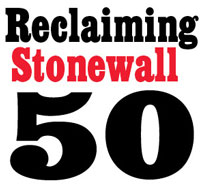 This year’s Pride Month celebration is especially important to me as we mark the 50th Anniversary of the Stonewall uprising on June 28, 1969, in New York City.
This year’s Pride Month celebration is especially important to me as we mark the 50th Anniversary of the Stonewall uprising on June 28, 1969, in New York City.
I was just a kid when Stonewall happened. Growing up, I didn’t learn about Stonewall in history class, so when I was in college, as part of my coming-out process, I took the time to learn about the history of the LGBTQ community and the fight for equality for our community. What I learned is that Stonewall is a uniquely American story of those who came before us and let their voices be heard. Those that bravely stood up and spoke out so that others wouldn’t feel compelled to live in silence.
When we look back at Stonewall and the activism that grew out of that moment, even the most basic progress seemed like it would take a revolution to achieve. So we had one. And that is how we have made such enormous progress over the last 50 years.
Five years after Stonewall, in 1974, Kathy Kozachenko became the first openly gay person elected to political office in the United States, winning a seat on the Ann Arbor City Council in Michigan. Three years later, in 1977, Harvey Milk was elected to the San Francisco City Council. In 1986, I was elected to the Dane County Board of Supervisors in Madison, Wisconsin. It was my first role in elected office, and I was the third openly gay person to serve on the Dane County Board, so I was grateful for those who had come before me. That year, I joined several colleagues for an international conference of openly gay elected officials to share stories, discuss our personal journeys to public office, and talk about how we could work together to help elect more openly LGBTQ people to public office. At the time, there were just 14 people in that conference, and we figured that across the world there were about two dozen other openly gay elected officials. Today, in stark contrast to the first days of that conference, there are 670 out LGBTQ people serving in public office in the United States.
This country is right to be proud of the progress we have made, but we cannot mistake progress for victory. Our fight for equality continues, and we have more work to do to move our country forward.
It is just wrong that in a majority of states in this country, LGBTQ Americans live without fully inclusive nondiscrimination laws and are not fully protected from being fired, evicted from their home, or denied services simply because of who they are or who they love. It is time to end this kind of discrimination so that LGBTQ Americans have the freedom of full equality. This is why I have introduced the Equality Act: because all Americans deserve the opportunity to dream the same dreams, chase the same ambitions, and have the same shot at success.
On May 17, 2019, the House of Representatives took an historic step forward by passing the Equality Act with bipartisan support, but right now, we face an uphill battle passing it in the United States Senate. President Trump has already stated that he opposes our bipartisan legislation to ensure full equality for every LGBTQ American across our country. That is why the 2020 election is so important, because it is an opportunity to pass on to the next generation an America that is more equal, not less.
Today, we must stand together as our brothers and sisters did 50 years ago, on the right side of history. Let us work to take the next step forward in the march for fairness, freedom, and full equality for every LGBTQ American. And let us be inspired to fulfill this country’s promise of liberty and justice for all, guided by the courage of this story, the story of Stonewall.


